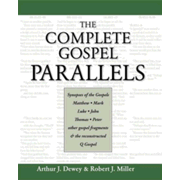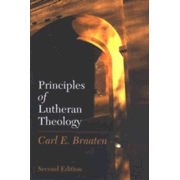ON THE Fourth Sunday after Epiphany
we hear from the Gospel According to Saint Luke. The account singularly
portrays a fickle people, and warns us to remain centered in the Word rightly spoken
to us.
PLEASE NOTE: An alternate reading for this Sunday exists as Luke 4:31-44... however
that reading so closely aligns with the earlier written Mark 1:21 and
following, if you so desire to refer to that discourse, click the call out provided
here..,
This Lukan account, however, singularly
portrays a fickle people and warns us to remain centered in the Word rightly spoken
to us…
And
he began to say to them, “Today this scripture has been fulfilled in your
hearing.”
And all spoke well of him, and wondered at the
gracious words which proceeded out of his mouth; and they said, “Is not this
Joseph’s son?”
And he said to them, “Doubtless you will quote
to me this proverb, ‘Physician, heal yourself; what we have heard you did at
Capernaum, do here also in your own country.’”
And he said, “Truly, I say to you, no
prophet is acceptable in his own country. But in truth, I tell you, there were
many widows in Israel in the days of Elijah, when the heaven was shut up three
years and six months, when there came a great famine over all the land; and
Elijah was sent to none of them but only to Zarephath, in the land of Sidon, to
a woman who was a widow. And there were many lepers in Israel in the time of
the prophet Elisha; and none of them was cleansed, but only Naaman the Syrian.”
When they heard this, all in the synagogue
were filled with wrath. And they rose up and put him out of the city, and led
him to the brow of the hill on which their city was built, that they might throw
him down headlong. But passing through the midst of them he went away. (Luke 4:21-30)
 |
The Complete Gospel Parallels By Arthur J. Dewey & Robert J. Miller |
What
Say You?
In our good news lesson from Saint Luke, we see that
many persons within the synagogue did not accept the pronouncement from Jesus
that his arrival fulfilled an ancient prophecy. Indeed, our Lord had said that
the he was the Messiah… the Christ… the Deliverer. The gospel of Luke related
that although the congregation initially spoke well of him, a continued reading reveals that their
favorable attitude was not to last. This occurred as he was challenged that they knew him. He had grown up in that town. He then told them that a prophet was not received
in his own country. We find to a somewhat
lesser degree, Mark and Matthew also had written concerning this wrathful rejection.
Both of these gospels said this in a rather brief manner.
Given that Luke picked up that same tradition, we find that he also emphasized the scene that began to turn from favorable to very hostile. Only Luke, records further the "Why?" of his rejection. In reading Luke, we echo, "Why were the
synagogue elders and populace so upset?" I think that the traditional hold of the leadership over the people
was being challenged. This jealous foment in the synagogue brought Jesus to speak further.
 |
The Gospel of Luke: New Cambridge Bible Commentary By Amy-Jill Levine & Ben Witherington, III |
We read that the first scene he lifted up came from Israel’s recorded history. The tradition was inherited from the ministry of the prophet Elijah. Our Lord pointed out that during a “dry” time, when Israel was punished by God for straying from his ways... divine grace was given by the prophet to an “outsider”. This had occurred though the children of God brought from bondage in Egypt remained oppressed.
Immediately
after that abrasive reminder, Jesus also reminded concerning Namaan, a military officer from Syria. Naaman was mentioned as being favored by a healing from leprosy.
Both of these cited examples spoken by Jesus raised the growing ire of the congregation. They reacted violently. Given this, we now ask, “Why did Luke cite this scene when the other synoptic gospels did not?” The answer I consider may lay rooted in the location and time of the gospel’s writing. The scene told of was very relevant to Luke's Greek and Roman people. If we take that this was likely written in or around the city of Corinth, and was penned during the mid-to-late 8th decade of the first century… we have a historical hint. You see, that history centers us in a time period when the early Christian Church was breaking away from the synagogues throughout the Greek provinces.
At that time, many Jewish rabbinical authorities had openly persecuted the Christians. Consequently this gospel telling rightly addressed the status of those who were cast out, challenging persons concerning those unbelieving Jews in their status as the chosen people of God. This was remembered, and likely written as a warning to the Christian Jews of his day, and an affirmation to the Gentile nations.
Both of these cited examples spoken by Jesus raised the growing ire of the congregation. They reacted violently. Given this, we now ask, “Why did Luke cite this scene when the other synoptic gospels did not?” The answer I consider may lay rooted in the location and time of the gospel’s writing. The scene told of was very relevant to Luke's Greek and Roman people. If we take that this was likely written in or around the city of Corinth, and was penned during the mid-to-late 8th decade of the first century… we have a historical hint. You see, that history centers us in a time period when the early Christian Church was breaking away from the synagogues throughout the Greek provinces.
At that time, many Jewish rabbinical authorities had openly persecuted the Christians. Consequently this gospel telling rightly addressed the status of those who were cast out, challenging persons concerning those unbelieving Jews in their status as the chosen people of God. This was remembered, and likely written as a warning to the Christian Jews of his day, and an affirmation to the Gentile nations.
Consider this! History has shown that some twenty years
had passed since the Jews had been tromped on by the Roman authorities in Jerusalem. Afterward they had suffered defeat in the battle for the fortress at
Masada. We know that continued Jewish unrest would eventually lead to yet another
rebellion after the cusp of the century… one that would again result in further persecutions.
You see, in the midst of great religious turmoil, Luke demonstrated that the fault lay not with either the whim or anger of the
divine, but the unbelief of the Jews in accepting Jesus as the Son of God. Thus it was
that Luke accented that foreign unbelievers had received graceful faith, even from time long past. Thus his gospel pointed out that both the Greeks and Romans of the Empire had become favored by
God.
What
Now?
A warning therefore rings out to we of the present-day Church. We
now live in a complex, modern world inhabited by persons of many faith expressions.
Therefore, we may assume that since the past proves that favor for the Church rises and falls like the waves
of the sea, we may also grant that this
text holds both a great warning, and a bright future for us.
As we gather in our Christian
pews this week, I suggest that we think thoroughly on this lesson. Consider whether our
denomination clearly expresses the divinity of Jesus, the One who brought us freeing
salvation? Or do we quietly sit back unconcerned while some question his divinity... even when these challengers stand in leadership or sit in the pews.
The question arises, "Do we turn the congregation into a legalistic outpost of modern cultural values... or sway to various cult prostitutes who stray far from a right understanding of the gospel message?" In summary then, I ask you, “Do we try to drive our Resurrected Lord from our midst, or do we rather realize our sin and accept the saving grace of forgiveness given?” Be warned here! Honest answers to these questions may drive us rightfully to our knees before the cross.
The question arises, "Do we turn the congregation into a legalistic outpost of modern cultural values... or sway to various cult prostitutes who stray far from a right understanding of the gospel message?" In summary then, I ask you, “Do we try to drive our Resurrected Lord from our midst, or do we rather realize our sin and accept the saving grace of forgiveness given?” Be warned here! Honest answers to these questions may drive us rightfully to our knees before the cross.
 |
Principles of Lutheran Theology Second Edition By Carl E. Braaten |
If we should wonderfully find ourselves bowing sorrowfully before the Lord our God... we know that we can be uplifted in knowing that grace through Christ crucified, shall restore us again as his people. Certainly this forgiveness is yet available to us through the power of God, as expressed mainly in our church worship through the Rite of Confession and Forgiveness, Holy Baptism and participation in the Sacrament of the Holy Eucharist. We know that through these things we are made free and empowered through that same Spirit who works grace in our lives.
Though some of us may believe that we have a personal relationship with Jesus Christ and that is enough, we often act to spurn his great work through the Church. To these, I say that we can be certain that we are free to become servants of God who work together. Together we can more powerfully and thoroughly proclaim the good news.
Remember! By God’s grace we are given knowledge
and strength to speak to our unbelieving neighbors in this world. Thus we can together pray that the Spirit will open the ears and hearts of those
who find themselves as deceived through their own unbelief, religious error or spiritual laziness. Whether
these to whom we speak may be found as Muslim, Hindu, Buddhist, Agnostic, or Atheist… by the
power of the Father, and the Son, and the Holy Spirit they may rightly be confronted by the Word. Each can be called to decide. Will they accept or reject the Holy Spirit's driven witness about our crucified Lord... he who who died that we may live? How shall we know unless we witness to them?
Blessings to you through the Holy Spirit from God, our Father and his Son, Jesus Christ... on this day and forever more!


No comments:
Post a Comment